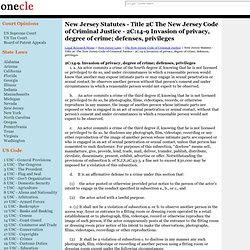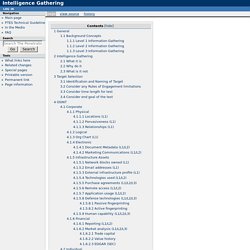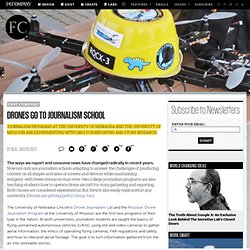

So This Is How It Begins: Guy Refuses to Stop Drone-Spying on Seattle Woman - Rebecca J. Rosen.
Objective 1 - Freedom of the Press/Expression. New Jersey Statutes - Title 2C The New Jersey Code of Criminal Justice - 2C:14-9 Invasion of privacy, degree of crime; defenses, privileges - New Jersey Attorney Resources - New Jersey Laws. Legal Research Home > New Jersey Laws > The New Jersey Code of Criminal Justice > New Jersey Statutes - Title 2C The New Jersey Code of Criminal Justice - 2C:14-9 Invasion of privacy, degree of crime; defenses, privileges 2C:14-9.

Invasion of privacy, degree of crime; defenses, privileges 1. a. An actor commits a crime of the fourth degree if, knowing that he is not licensed or privileged to do so, and under circumstances in which a reasonable person would know that another may expose intimate parts or may engage in sexual penetration or sexual contact, he observes another person without that person's consent and under circumstances in which a reasonable person would not expect to be observed. b.
C. D. . (1) the actor posted or otherwise provided prior notice to the person of the actor's intent to engage in the conduct specified in subsection a., b., or c., and (2) the actor acted with a lawful purpose. (a) to law enforcement officers in connection with a criminal prosecution; f. G. H. Hunter Moore: The Most Hated Man on the Internet. Intelligence Gathering - The Penetration Testing Execution Standard. This section defines the Intelligence Gathering activities of a penetration test.

The purpose of this document is to provide a standard designed specifically for the pentester performing reconnaissance against a target (typically corporate, military, or related). The document details the thought process and goals of pentesting reconnaissance, and when used properly, helps the reader to produce a highly strategic plan for attacking a target. Background Concepts Levels are an important concept for this document and for PTES as a whole. It’s a maturity model of sorts for pentesting. The Intelligence Gathering levels are currently split into three categories, and a typical example is given for each one. Level 1 Information Gathering (think: Compliance Driven) Mainly a click-button information gathering process. Acme Corporation is required to be compliant with PCI / FISMA / HIPAA.
Level 2 Information Gathering Level 3 Information Gathering. Inside Israel's Social-Media Command Center - Brian Fung. What -- and who -- is behind @IDFSpokesperson?

Twitter With so much attention given to the digital war between Hamas and Israel, it was only a matter of time before we were going to get a behind-the-scenes tour of the IDF's social media command center. Tablet, BuzzFeed, and FastCompany have gained access to the team -- and what they find is a nimble and progressive operation that's taking active learning cues from its daily experience liveblogging the war.
The IDF's experiment with social media began in 2008 during Operation Cast Lead with 25-year-old Aliza Landes, a member of the IDF's PR team for North American reporters. As with many successes, the IDF's experiment with social media began as a "pet project" that took on a life of its own: Over the course of the latest conflict in Gaza, the IDF has moved into some uncharted digital territory. Liebovich also takes pains to credit the youth of her staff: That's a sentiment echoed by other members of Leibovich's team. I don't think ... Drones Go To Journalism School. The ways we report and consume news have changed radically in recent years.

Now not only are journalism schools adapting to answer the challenges of producing content on all shapes and sizes of screens and devices while maintaining integrity--with fewer resources than ever--two college journalism programs are also teaching students how to operate drone aircraft for story-gathering and reporting. Both classes are considered experimental. But they're also easily replicated at any university. (Drones are getting pretty cheap, too.) The University of Nebraska-Lincoln's Drone Journalism Lab and the Missouri Drone Journalism Program at the University of Missouri are the first two programs of their type in the nation. Both programs are experimental, but operate in different ways. However, the Missouri Program is a partnership between the university's Journalism School, Information Technology program, and a local NPR affiliate, KBIA.
[Image: Flickr user Aaronperecki] Drone Journalism Lab.